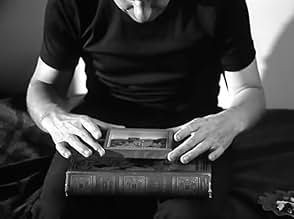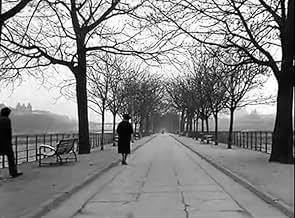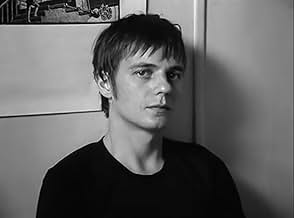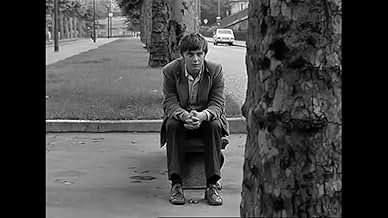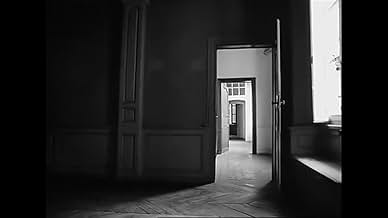A 25-year-old male student in Paris becomes indifferent to the world around him, and subsequently feels a strong sense of alienation and hopelessness.A 25-year-old male student in Paris becomes indifferent to the world around him, and subsequently feels a strong sense of alienation and hopelessness.A 25-year-old male student in Paris becomes indifferent to the world around him, and subsequently feels a strong sense of alienation and hopelessness.
- Awards
- 1 win total
A student who's about to end his studies decides overnight to stay completely indifferent to the world that surrounds him. It's a silent, black & white movie only enhanced by a woman voice over which introduces the young hero to the audience and comments from his own standpoint his actions. Although we don't know the reasons of his retirement from the world, we learn many things of his lifestyle: his bedroom, his wage, his eating habits, his wandering all over Paris etc... It's interesting to note down the mellow voice-over of the woman that gradually gets worried and angered. Indeed, our student is at first completely silent and indifferent but then anxiety, fear overcome here. Is it really possible to stay indifferent like that during a lifetime? Is there a possible exit?
This film could be a cousin of Alain Jessua's debut film "La Vie A L'Envers" (1964) in which a man stops to comply to the routine of everyday life. Such is also the case here. Only the voice-over enables the audience to penetrate the empty soul of this young man and to try to decipher his thoughts although as I previously said his motivations to refrain from social life remain blurred. Through him, Pérec wanted to express his view on French society but in a neutral way. He was always interested in it and showcased it in several of his books especially "La Vie: Mode D'Emploi" (1978). Given the anguished tone adopted by the voice in the second half of the film, the writer probably feels fear towards the banality and the mundane character of everyday life that offers no exits. Perhaps that's what our main hero tries to do: to stay in silence to try to discover another world. But it is bound to fail. So what to do?
Jacques Spiesser is perfectly directed and his expressionless faces capture the nothingness he voluntarily creates all around him. He is at the center of an arty film which tries and succeed to depict the humdrum common life that can verge towards absurdity.
- dbdumonteil
- Aug 12, 2009
- Permalink
Storyline
Did you know
- TriviaThe film has several paintings by René Magritte: "La reproduction interdite" (1937), over Man's bed is the most prominent. The surreal cinematography also references "Pilgrim" (1966) and possibly other works of his as well. Also featured over the bed is "Relativity" by M.C. Escher.
- Quotes
Narrator: It is on a day like this one, a little later, a little earlier, that you discover, without surprise, that something is wrong, that you don't know how to live and that you never will. Something has broken. You no longer feel some thing which until then fortified you. The feeling of your existence, the impression of belonging to or being in the world, is starting to slip away from you. Your past, your present and your future merge into one. You are 25 years old, you have 29 teeth, three shirts and eight socks, 500 francs a month to live on, a few books you no longer read, a few records you no longer play. You don't want to remember anything else. Here you sit, and you only want to wait, just to wait until there's nothing left to wait. You go back to your room, you undress, you slip between the sheets, you turn out the light, you close your eyes. Now is the time when dream-women, too quickly undressed, crowd in around you, the time when you reread ad nauseam books you've a read a thousand times before, when you toss and turn for hours without getting to sleep. This is the hour when your eyes wide open in the darkness, you hand groping towards the foot of the narrow bed in search of an ashtray, matches, a last cigarette, you calmly measure the sticky extent of your unhappiness. Unhappiness did not swoop down on you, it insinuated itself almost ingratiatingly. It meticulously impregnated your life, your movements, the hours you keep, your room, it took possession of the cracks in the ceiling, of the lines in your face in the cracked mirror, of the pack of cards; it slipped furtively into the dripping tap on the landing, it echoes in sympathy with the chimes of each quarter-hour from the bell of Saint-Roch. How many times you have repeated the same amputated gesture, the same journey's that lead nowhere? All you have left to fall back on are your tuppeny-halfpenny boltholes, your idiotic patience, the thousand and one detours that always lead you back unfailingly to your starting point. All that counts is your solitude: whatever you do, wherever you go, nothing that you see has any importance, everything you do, you do in vain, nothing that seek is real. Solitude alone exists, every time you are confronted, every time you face yourself.
- How long is The Man Who Sleeps?Powered by Alexa
Details
- Runtime1 hour 17 minutes
- Color
- Sound mix
- Aspect ratio
- 1.37 : 1
Contribute to this page





